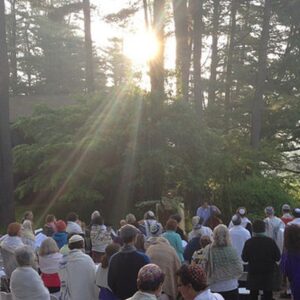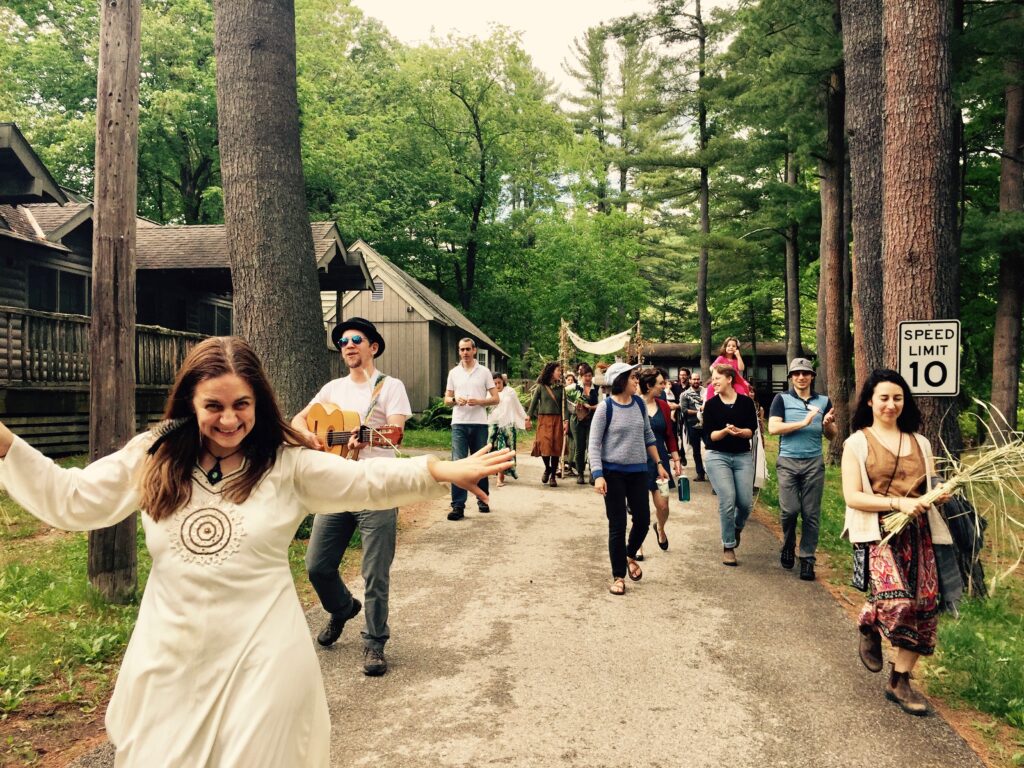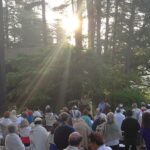“Resilience: the capacity to withstand or to recover quickly from difficulties; toughness“
Oxford dictionary
Tonight, we step into Shavuot, our early summer celebration of the wheat harvest and the giving of the Torah on Mount Sinai. Both Adamah centers—Pearlstone and Isabella Freedman—are welcoming a diversity of participants for retreats filled with deep learning, soulful singing, and vibrant community. We come together amidst great ongoing trauma in Israel and Gaza, rising antisemitism worldwide, and great uncertainty as to what may happen next.
Two months ago in Israel, I had a profound conversation with a deeply respected partner, sharing together the pain flowing through Israel and the Jewish People right now, and the many challenges facing our people and our planet. We wondered together: how do we cultivate resilience in this moment? I have been thinking about it a lot lately, and what a Torah of Resilience might be.

Much of the resilience literature focuses on emotional and mental well-being, but as the Jewish philosopher Philo teaches us, “the body is the soul’s house”. At our Pesach at Pearlstone retreat, we learned from our wonderful health and wellness educator, Debra Fertig, that our top priority health practices should be ensuring quality sleep, nutrition, and exercise. The benefits of these practices come about through ongoing choices, patterns, rhythms, and habits—and Jewish tradition overflows with the scaffolding of daily practices that we can choose to leverage into healthy resilience. These past 49 days of Counting the Omer are a powerful example, slowing down to make every day count. At Adamah, these seven weeks have embodied our blossoming spring season, filled with daily resilience practices: prayer and gratitude, hitbodedut– nature meditation, Torah learning, and daily exercise aligned with shmirat haguf- the commandment to care for our bodies.
Beyond physical health, research now clearly shows that strong relationships are the most powerful factor in helping us live longer, happier (more resilient) lives. And on a societal scale, Climate Resilience efforts focus on our infrastructural preparedness for the ongoing planetary changes all around us. For example, how did you and your school-camp-etc respond to last summer’s wildfires and dangerous air quality days? Were you able to access climate resilient indoor air filtration systems? And in that sense, how do we prioritize resilience not only as a health and well-being practice, but also as a public safety and justice issue in the age of climate change?
And what about the question of when we focus on resilience? Depending on whether we are investing in before or after we need it, our resilience perspectives and priorities may be quite different—preventative vs recovery, strengthening vs healing. Surely, we have an obligation to do both now that we see how many forms of resilience we all need, especially our young people. Because as our sense of Polycrisis grows, we must ask ourselves how we can work together to maximize the resilience of the Jewish People—individually and collectively—to find our way through this storm?
Through the lens of resilience, Torah and Jewish tradition can be seen not only as a gift from G!d, but also as the precious Resilience Toolkit given to the Jewish People. First received at the beginning of our great national liberation journey, we piloted resilience as we found our way through the desert, then more fully implemented the framework in ancient Israel, after which it was radically transformed after exile, and has thereafter continuously evolved through the millennia, tweaked by its rabbinic stewards in response to the resiliency needs of each generation and the challenges of their time.

Now, in our time, the need for resilience calls forth a Torah of the Earth, reconnecting us to the joy and beauty and balance of the physical source of all life, the earth, from where we come and to where we return.
This is the groundbreaking Torah of Resilience we seek to learn and teach at Adamah, that we hope to embody this Shavuot, so that our participants at Pearlstone, Isabella Freedman, and in Adamah Shavuot programs nationwide. Our goal is to help people experience this Torah of the Earth, feel more resilient, connect with our people and our planet, and ground ourselves together in joy, belonging, love, and hope- so that we may help build a more sustainable future for all people.
Wishing you and yours a holiday—and a summer—filled with emotional, physical, individual, and collective resilience.
Chag Sameach, and Happy Shavuot,
Jakir
Chief Executive Officer
